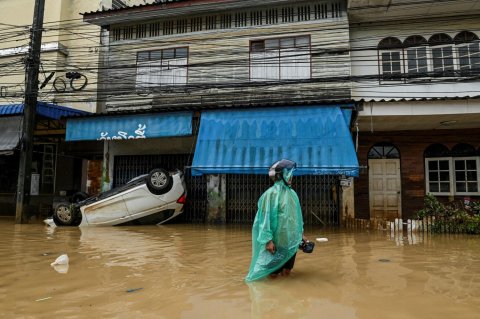Showing 1 - 9 of 9
Rethinking local flood management
News, Peerasit Kamnuansilpa, Published on 12/12/2025
» As global temperatures rise, extreme rainfall and severe flooding are happening around the world. The science is clear; with every 1 degree Celsius increase, the atmosphere will hold 7% more water vapour. This may explain why storms are more intense as the world warms.
The effects of unfinished momentum
News, Peerasit Kamnuansilpa, Published on 08/11/2025
» Why do some nations surge confidently into the future while others advance only in half-steps, not declining but not accelerating either? In their influential book Why Nations Fail (first published in 2012), Daron Acemoglu -- now a Nobel Prize economist -- and James Robinson, both economists and political scientists at the University of Chicago, offer a helpful lens for understanding Thailand's development path without casting blame or provoking division.
From FDI to homegrown growth
Oped, Peerasit Kamnuansilpa, Published on 11/09/2025
» For decades, Thailand has leaned heavily on foreign direct investment (FDI) as the engine of growth. That strategy once delivered jobs and exports, but today it yields diminishing returns. Inflows are volatile, competitiveness is slipping, and dependence on external capital leaves the economy vulnerable to global shocks. Thailand must change course.
Thailand must redefine FDI for future
News, Peerasit Kamnuansilpa, Published on 14/08/2025
» Thailand's economic future looks increasingly uncertain. Once a rising star among emerging markets, the country now faces persistent stagnation. A key reason lies in how we have treated foreign direct investment (FDI) -- not as a strategic lever for national economic development but as a short-term fix driven by rent-seeking behaviour, bureaucratic collusion, and a failure to safeguard the nation's long-term economic interests and its goals for equitable development.
Lessons and hopes from May 11 poll
Oped, Peerasit Kamnuansilpa, Published on 22/05/2025
» The May 11 municipal elections across Thailand, although extensive in scope, offered little to celebrate in terms of democratic progress. Rather than signalling a political shift or new energy in local governance, the results underscored a deeply familiar pattern: vote buying remains the dominant strategy in Thai politics.
The roadway to enabling governance
Oped, Peerasit Kamnuansilpa, Published on 30/04/2025
» On May 11, communities across Thailand will vote in 2,469 municipal elections. Despite these polls being routine, they are a pivotal test of the country's commitment to moral leadership and enabling governance at the grassroots level.
Harnessing Thailand's human capital
News, Peerasit Kamnuansilpa, Published on 28/06/2024
» Thailand is currently on a distressing trajectory towards depopulation, with the number of deaths each year surpassing the number of births. The latest available data from the Department of Provincial Administration paints a grim picture, showing over 48,000 more deaths than births last year. This number is set to escalate as the number of births continues to plummet and death rates surge. Should the current trend persist, by 2083, Thailand's population is projected to shrink by half to 33 million. The leading cause of this demographic dynamic is the decline in fertility rates among Thai women. These declining fertility rates have severe repercussions and thus warrant the attention and actions of national leaders.
Where did we go wrong in the battle against Covid?
Oped, Peerasit Kamnuansilpa, Published on 04/08/2021
» In January, a mere seven months ago, I and two of faculty members at the College of Local Administration, Khon Kaen University, co-authored a paper titled, "Locally-Driven Action in Pandemic Control: A Case of Khon Kaen Province". This article presented the results of a study that examined the local action taken in Covid-19 control and prevention measures in Khon Kaen. At that time, Thailand was among the leading nations in the world in Covid control.
Participatory democracy: A way forward for Thais
Oped, Peerasit Kamnuansilpa, Published on 25/06/2021
» A functional parliament is a strong foundation of a participatory democracy. Globally, the governing bodies of the socio-economically and politically advanced countries operate under some form of participatory democracy.











